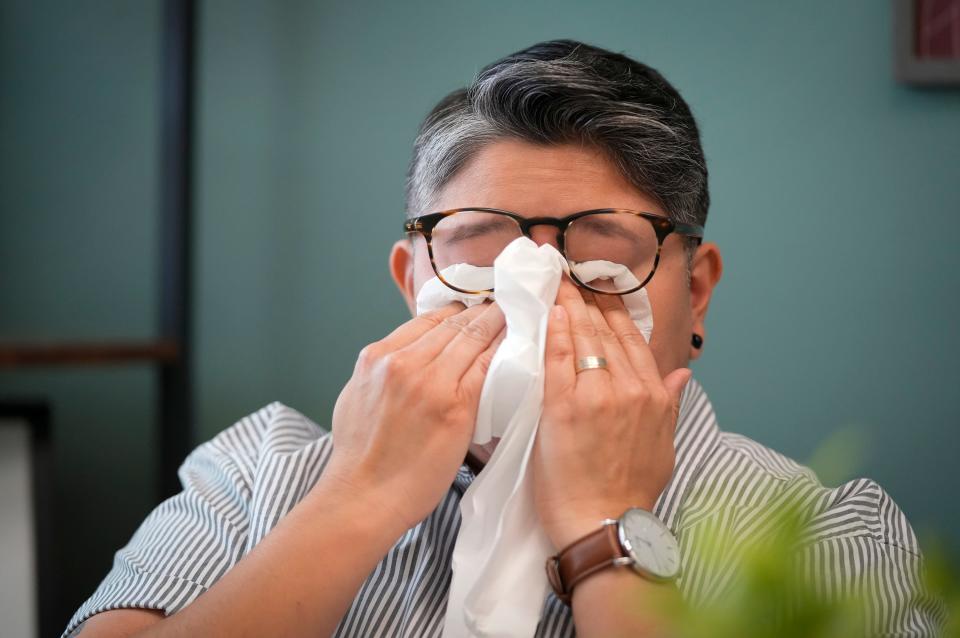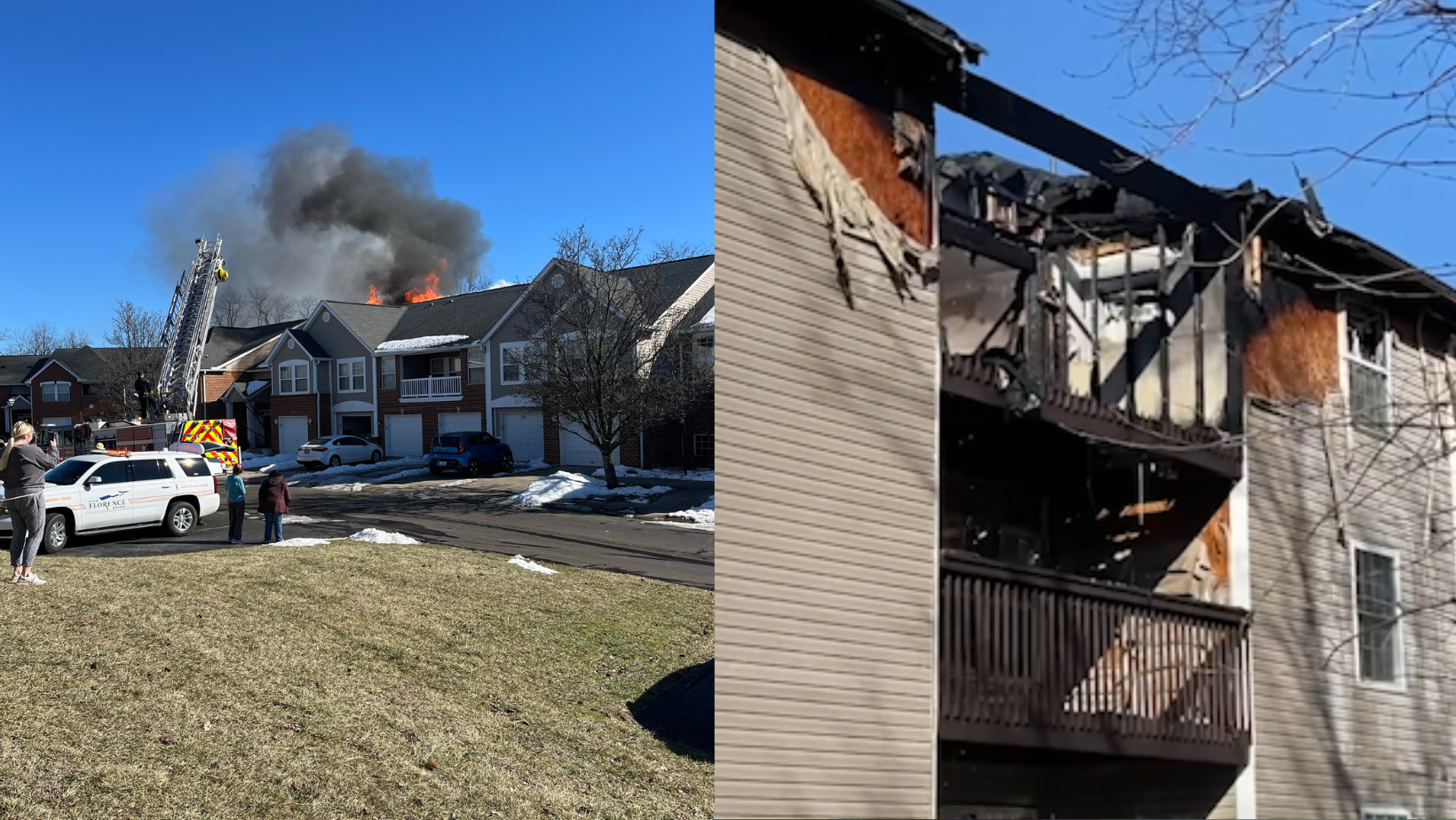In the web of the University of Texas, Alicia Moreno was one spindle in a massive wheel of student support — her job tailored to help a neglected student population and their specific needs.
Her newly painted corner office in the Student Services Building — decorated with cards from undocumented students she mentored before Jan. 1, green plants and a UT President’s Exemplary Service Award given to her in spring — was part of a buzzing atmosphere that made the Division of Community and Campus Engagement home for so many students.
The last thing on her mind was losing that space.
But on April 2 — four months after Senate Bill 17, a state law that bans diversity, equity and inclusion offices and related functions at public universities, changed the scope of Moreno’s work significantly and restructured that very school support wheel — the career she had known for the past seven years would come to a screeching halt.
She got to the office at 8 a.m., after her 50-minute commute, walked through the glass doors on the third floor and began preparing for her financial aid workshop. By 9 a.m., she received a calendar invitation from an unknown sender: “Meeting attendance required.”
In less than three minutes, a UT human resources representative told Moreno and her colleagues on that call that they were being terminated. No one had the function available to unmute.
In an instant, all the programs Moreno and her colleagues had built were gone.
“I was at a loss for words,” she said.

Moreno was one of 49 former DEI staff members who UT President Jay Hartzell laid off April 2 in a reorganization after UT’s compliance with SB 17. Later, he’d tell faculty that he believed UT had been compliant with SB 17 on Jan. 1, when the DEI ban went into effect, but “it’s been clear … some disagreed.”
At 1 p.m. that day, Hartzell sent a universitywide email announcing that UT would close the Division of Community and Campus Engagement due to “redundancy” after evaluating its programs once the DEI functions were eliminated. After nearly two weeks of silence, he said at a Faculty Council meeting that it was also due to conservative pressure.
What happened that spring day was a turning point. To the staff, it was a betrayal. Their jobs aligned with a personal passion to support people on campus who needed it. It was a way to repair historical inequities that kept students from fully succeeding — barriers the staff had often experienced too. After months adapting to SB 17, they certified their programs’ compliance and felt safe again. On April 2, it was all taken away.
Anti-DEI laws have swept through Republican-led states across the nation since 2023. Texas was the second state, after Florida, to pass such a law.
State Sen. Brandon Creighton, the author of SB 17, said DEI is ineffective, divides students, hurts innovation and discourages free speech. Ahead of May hearings to assess each university system’s compliance, he warned chancellors to fully comply with the law or face the potential loss of state funding and other legal consequences. Exactly a week later, Hartzell announced the layoffs.
“The actions by the University of Texas demonstrate that they are taking steps to ensure compliance with SB 17—the strongest ban on DEI in the nation,” Creighton said in a statement to the American-Statesman. “Now that we are in a new era, Texas taxpayer funded higher education can return to a merit-based framework that will better serve their students and faculty.”
UT spokesperson Mike Rosen said that, as a public institution, UT is obligated to “be responsible stewards” of public money and that the cuts will increase the institution’s operational efficiency. He said all students will have support “without regard to their protected characteristics.”
Of the laid-off UT staffers, several were alums like Moreno. Some had worked at the university for more than a decade. They had university-covered health insurance and bills to pay, but also students who counted on them for support.

To UT alum Ruben Cantu, whose father mopped the UT Main Building’s floors, bringing his equity-focused startup to the university and leading academic programs for other disadvantaged students “was throwing down the rope and making sure I wasn’t the only one who was going to make it.”
To Ryan Sutton, who stayed to work full time in the division after a fellowship with the Hogg Foundation for Mental Health, UT was a place he could transform the experience for Black students and connect them to resources that they didn’t know could help them profoundly.
And to Lilli Hime, being a program coordinator at the Gender and Sexuality Center was a dream job — a way to build more community for LGBTQ+ students, particularly among students of color, and nurture a place that was safe from political attacks.
On July 5, they all worked their last day.
“This isn’t my fault,” Moreno said. “This is politics.”
‘I saw myself in those Black and brown kids’
Moreno has cropped black and silver hair, wears tortoiseshell glasses and carries a wide smile. She lives in Buda with her wife and enjoys rock climbing and hiking. She has a doctorate degree in higher education leadership.
But this life wasn’t a given for Moreno. With every step forward, she would face and have to overcome challenges — some rooted in American history.
Two hundred years ago, San Antonio quartered off its west side for Mexican Americans, who were legally barred from buying property elsewhere. Throughout Texas from 1848 to 1928, Mexican Americans faced violence — sometimes at the hands of Texas Rangers — attacks on voting rights, school segregation and severe discrimination.
Moreno was born in that same neighborhood, about 80 miles south of Austin. It was majority Latino and low income; her school district was the poorest in San Antonio. But by middle school, she was convinced she wanted to go to college — something many at her school doubted was a possibility for them, and something neither her parents nor grandparents had done.

“I put on a brave face. I tried to argue as best as I could, but it felt like I was arguing with a wall,” Alicia Moreno said of her effort to try to save the Monarch program for undocumented, mixed-status or immigrant students at UT.
Her freshman year in high school, representatives with Upward Bound, a federal support program that helps first-generation low-income students pursue higher education, made a presentation at her school. “I took a flyer home to show my mom, and I said, ‘I want to do this,’” Moreno recalls.
Moreno learned how to apply for financial aid and write a college essay. She also shared what she learned in the program with her friends who didn’t participate, motivated to make sure they had the same support she did.
When she enrolled at the University of North Texas, the challenges she faced expanded. She took out student loans when financial aid didn’t cover expenses. She worked two jobs, but she still sometimes had to make $10 last a week.
As a college mentor at her college’s Office of Outreach, she noticed a gap in need based on a student’s ZIP code. As part of her mentoring, she’d visit high schools where students drove new cars, practiced on insulated football fields and didn’t have to apply for financial aid. Two days later, she could find herself visiting a school without those resources, and where students needed someone to tell them they could pursue their dreams anyway.
“I saw myself in those Black and brown kids,” Moreno said. “And I was like, ‘That’s not right.’”
Moreno wasn’t the only one who noticed that pattern. The Division of Diversity and Community Engagement, formed at UT in 2007, was created not only to be a resource for students, but to help address “systemic disparities” in underserved Central Texas communities — a mission that aligned deeply with Moreno and others who valued the importance of that help and belonging.

Alicia Moreno
Coming from Howard University, a historically Black institution, Sutton knew what it meant to be in a place where students see themselves in their peers, school leadership, curriculum and teachers, and he wanted to support that. He was approached to come to UT because a sense of belonging for students of color, even with the Division of Diversity in place, was rare. At UT, only 5.4% of the student population is Black; more than 30% is white.
“It shook me pretty hard,” Sutton said of his arrival. After his fellowship, he worked at the Heman Sweatt Center for Black Males partnering with community mental health resources. He was promoted to associate dean of DEI at Dell Medical School in 2021, and he developed trainings to illustrate how recognizing differences when treating a patient improved their outcome.
Hime worked at the check-in desk at the 20-year-old Gender and Sexuality Center, welcoming people into a space filled with books, bean bags and paper cranes. It offered mental health drop-ins, weekly conversations on the experience of being transgender, and special groups for LGBTQ+ people of color, where Hime saw participants “come alive with each other.”
Student advocacy brought many of those spaces to life, but UT invested in them, too. Outside of the division, six UT-sponsored student groups called the Multicultural Engagement Center their home with a budget and support staff to prop up the community they so needed. UT recruited Cantu, an East Austinite and first-generation student who became a Longhorn, to start the Office of Inclusive Innovation and Entrepreneurship to mentor and teach underrepresented students like himself.
In 2017, Moreno pursued a graduate degree at UT and studied how minority students form their identities and navigate educational systems. Captivated, Moreno pursued a doctorate.
At the same time, she worked at the division to support first-year minority and first-generation students. Soon, another opportunity sparked Moreno’s passion: Monarch, a program at UT for undocumented, mixed-status or immigrant students, was hiring a staff coordinator.
The program served a population that experienced some of the same challenges as other disadvantaged students: fear of deportation, difficulty getting a job and struggling to navigate a campus that didn’t understand the students’ rights.
These were students who had asked for a staff member to help them for years. Moreno became that person.
Over the next two years, she grew to expect that asking a student in Monarch if they were OK brought them to tears — no one ever asked them that. She helped a student whose professor had iced them out after they disclosed their immigration status. She helped another with work authorization, and the student ran to Moreno’s office after they secured it. She attended an open mic hosted by students to hear their stories in their own words.
“It took everything in me to not cry because their stories were so powerful,” she said. “Despite all the odds, despite all the barriers, they’re here, persevering. I just thought it was so beautiful.”
‘Arguing with a wall’
Under President Gregory Fenves’ leadership, from 2015 to 2020, UT’s diversity resources won awards, and the university reached its highest graduation rates yet — boosting outcomes for students from underrepresented backgrounds, too.
After a white police officer killed George Floyd, a Black man, in Minneapolis, igniting social justice protests across the nation, Hartzell, then new to the office, committed to doing more to support Black students on campus. By 2023, the Diversity Division had more than 40 staff members and dozens of programs, and benefited from donations exceeding $1.8 million, according to an open records request.
But in January 2023, a political fight over DEI bubbled up nationally. The Manhattan Institute, an influential conservative think tank, released draft legislation for how to eliminate DEI at colleges. In February, Gov. Greg Abbott sent an executive order barring DEI in state hiring. Florida drafted a bill.
Moreno and Hime weren’t worried at first. Working in immigration and with LGBTQ+ pupils, politics had affected their students before. But this anti-DEI crusade was catching up to them faster than they could feel.

Alicia Moreno walks across the UT campus to her office June 4, weeks before her last day at the university.
On May 8, 2023, a Texas House Committee on Higher Education hearing to discuss SB 17, the anti-DEI in colleges bill, lasted 19 hours. More than 100 people stayed hunched over in stiff auditorium chairs until 3:30 a.m. to defend the programs. On their way to work, Hime got off the bus a stop early to drop off a comment card against the bill at the Capitol. After hours, they pored over the bill’s text with colleagues.
A month later, Abbott signed SB 17 into law.
At a meeting with Moreno’s center afterward, she tried to comprehend the bill’s purpose.
In mid-December, she got a message from her boss: UT’s legal department was reviewing Monarch. Until then, she had been told the program, which was not race-based, would be safe.
Four days before Christmas, Moreno sat at her work-from-home desk and joined a Zoom meeting with her colleagues and a lawyer from UT’s legal department, who informed them that the Monarch program had legal and reputational concerns.
“I put on a brave face. I tried to argue as best as I could, but it felt like I was arguing with a wall,” Moreno said.
The program was shuttered.
After the meeting, she sobbed. She carried the weight of the news with her through the holidays. She carried confusion, too. There were other programs for undocumented students across the country, but none had been shut down, she reasoned. Why was hers different? What would she tell her students?

Notes of affirmation are displayed in the UT office of Alicia Moreno.
The staff members the Statesman interviewed said UT’s legal department — the office charged with ensuring UT’s compliance with the law — made most decisions in December, one month before SB 17 was set to go into effect and six months after the law was passed.
At the same meeting, Moreno learned the school also closed the Multicultural Engagement Center, though staff had adapted the center to be open to all students. Separately, the Gender and Sexuality Center closed, and the Women’s Community Center opened in its place. (Later, the Women’s Community Center was notified April 2 that it also would be shut down.)
As spring came, Moreno pivoted from working at Monarch to lead the Global Leadership Program, a job she had concurrently in September. In March, Moreno received her Presidential Service Award. She started planning for the next school year.
Hime greeted the same students and some new ones to the new center. Cantu still taught his classes. Sutton, whose new job as associate dean of Dell Medical School became defined by helping the school comply with SB 17, pushed onward, now in charge of employee and student success.
But some students and higher education advocates also warned of a fearful climate growing at UT amid apparent overcompliance with SB 17. Students pushed for the Multicultural Engagement Center to reopen, and undocumented students mourned their loss of support.
On April 2, Sutton walked into the office of his boss, whose eyes were red and watery. After a year and a half of a “roller coaster” of meetings, stress and planning over compliance, he knew what was coming.
“It’s over,” Sutton recalls thinking.
‘I saw red’
April 2 is crystal clear for Moreno. The orange conference room where colleagues gathered after the call, some reduced to tears and shaking in disbelief. The confused look of students at the workshop, asking what happened. Her wife visiting her to make sure she was OK. The desire to just go home, but staying, determined to be there for students despite it all.
Then, Moreno wasn’t ready to process. After the semester ended, she avoided her office, imagining the plants losing their green color. Three to four weeks later, she broke down.
“I could feel everything in my throat,” she said. “I wanted to scream.”

“Despite all the odds, despite all the barriers, they’re here, persevering. I just thought it was so beautiful,” Alicia Moreno said of hearing the stories of students she helped.
UT estimates it recouped about $8.3 million total from the staffing and related expenses due to SB 17 going into effect and the April 2 layoffs. Two hundred and fifty-seven programs were cut, accounting for an additional $2.6 million in savings.
It was a bombshell hitting people’s plans. Cantu lost his university health insurance, his ability to reach new students and the hope of a promotion to associate professor that he had so coveted.
“No matter where I went in the UT System, Gov. Abbott still had his thumb on me,” Cantu said.
Cantu relocated part-time to Brownsville where he leads student programs about executive leadership, entrepreneurship and project management, which he hopes to eventually expand statewide. Sutton opened a private practice in psychological assessment and forensic evaluation, and he accepted an associate professor position at UT’s College of Education. Hime is back in school.
Moreno said she will keep advocating for educational opportunities for all students.
Therapy helped Moreno. So did being there with the students in the final days.
Moreno’s last work event was scheduled April 24 — a mental health workshop for her students that night. Before the workshop, she and Hime had arranged to walk over to a pro-Palestinian teach-in on the South Mall on campus. From a posted agenda, they understood the teach-in would involve lectures, art workshops, study breaks and food. Moreno dragged a cooler full of water given the heat that day.
But no one was at the mall. They walked to Speedway and heard the chaos before they saw it.
Moreno and Hime went to the front of the crowd, shocked by the number of police in riot gear they saw patrolling what became a pro-Palestinian protest. Fearing for their students, they linked arms with them in front of state police, who were on horseback corralling the crowd. Moreno and Hime were physically protecting the students for the first time. At one point, an officer’s bike pushed Hime to the ground.
“I saw red,” Moreno said.

“I could feel everything in my throat,” Alicia Moreno said of the weeks after the spring semester ended. “I wanted to scream.”
The relationships the 49 terminated staff members had with students — the trust and the rapport to navigate intense, nuanced situations safely — was something UT leadership didn’t have, Moreno said. The missed step of consulting support staff could have made the difference in deescalating tensions at the protest, she believes.
“They let go the very people who could have stopped this,” Moreno said. “That action could have been stopped.”
More than 130 people, including dozens of students, were arrested in total at the April 24 and 29 protests. All criminal trespassing charges were later dropped.
Moreno held her mental health workshop after the April 24 protest despite the exhaustion she felt, and it became a reflecting place for students to process what had happened that day.
Hime, who was at a rally for DEI at the UT Tower when a second protest and surprise encampment broke out April 29, canceled a doctor’s appointment to stay and protect students and their right to free speech. They handed out water, and afterward visited a student who was taken to a hospital for heat-related injuries.
A week later, on July 5, Hime rolled out of bed feeling hopeless, weighted by the heaviness of the recent events and mourning what was taken. But when they feel like this, they remember why it matters to share their story, to share what the work meant and how it was lost.
“I want the students to be able to find what the center was,” Hime said. “I want there to be a record for how do we build this.”
‘You will make this happen again’
In the devastation of the programs and spaces lost, students showed up for staff members too. At an emergency gathering April 2, hundreds of students, alerted by word of mouth, comforted one another. Every seat in the auditorium was filled, and an overflow room formed. Moreno, the only staff member there, was overcome by emotion.
“I just was in disbelief with how many people showed up on such short notice,” Moreno said.
Three weeks after April 2, Hime watched as student groups crafted a resolution to use the space left empty by the closure of the Women’s Community Center as a home for resources that could be saved.
When students packed the student government meeting where the resolution would be discussed, Hime welcomed others into the center to watch a livestream.
A supermajority passed the resolution, and Hime rejoiced. Though it will ultimately rely on UT approval, it would codify the student need that made the initial creation of the center attainable, Hime said. It proved students valued the center’s work enough to save it, even in the face of what can seem like impossible odds.
Rosen said leaders in the Division of Student Affairs met with students after the resolution passed and plan to continue discussions this semester, though the university will ultimately decide how to use the space.
“Community isn’t just the fluffy stuff. It’s showing up for each other in necessity,” Hime said, adding that, personally, “I have never felt more held by my community than these past few months.”
When the school year ended, Moreno attended an “undocu-graduation,” a community-fundraised ceremony at a local nonprofit where Monarch participants who were graduating could celebrate in a community that knew what it took to reach that goal.
Students ate tacos and conversed with their families and friends. Moreno stood and awarded each student a yellow stole. She planned a speech in her head, striking a balance between acknowledging what was lost and envisioning hope for what’s next.
When Moreno looks back at the year, she wants people to know that the work they did mattered and that DEI isn’t a political buzzword, but instead it represents meaningful, essential work that establishes an equal foundation for all students to succeed.
“I have all the faith and hope that you will make this happen again,” Moreno told the students.
Students handed her a gift and a card they all had signed. It was hard to read, she said, “to see the impact I had.”
Months later, Moreno keeps in contact with her students. She worries for them, even as she has hope they will persevere. She is angry at UT. April 2, she said, didn’t have to happen.
“It is a choice,” Moreno said.
This article originally appeared on Austin American-Statesman: University of Texas eliminated DEI, laying off staff, cutting supports
#slashing #DEI #programs #crushed #careers #halted #lifes #work









Leave a Reply